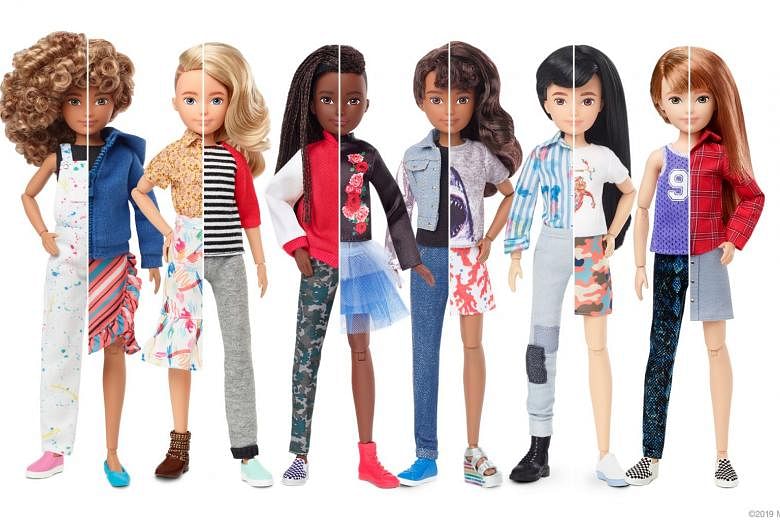LONDON (THOMSON REUTERS FOUNDATION) - The toymaker behind Barbie launched a range of gender-neutral dolls on Wednesday (Sept 25) which can be styled as either girls or boys, saying children were moving away from traditional stereotypes.
Mattel's "Creatable World" dolls come with removable wigs allowing them to switch between long and short hair, as well as outfits including both dresses and trousers, with the firm saying they offer "inclusive" play for all.
"We heard that kids don't want their toys dictated by gender norms," said Kim Culmone, senior vice-president of fashion doll design at Mattel.
"Toys are a reflection of culture and as the world continues to celebrate the positive impact of inclusivity, we felt it was time to create a doll line free of labels."
Some parents and feminist campaigners argue gendered marketing of children's toys and clothes limits girls' ambitions and reinforces gender stereotypes from a child's earliest years.
The growing number of children identifying as transgender and non-binary - who do not see themselves as male or female - has also boosted demand for toys which represent a wider range of gender identities.
Culmone said the new "gender-inclusive" dolls, which cost US$30 each (S$40), would allow "all kids to express themselves freely".
The move was hailed as a step forward by Jess Day of Let Toys Be Toys, which campaigns for gender-neutral toys, who said that children learn about the world through play and stereotyped marketing could have far-reaching consequences.
"It's really nice to see a doll line that is as welcoming to boys as it is to girls," Day told the Thomson Reuters Foundation, adding that she expected to see more manufacturers taking an inclusive approach.
"Toy companies have been quite slow to take on board that the world has changed. Most parents don't really want to see their children's interests limited."
Six in 10 parents agreed that product marketing "reinforces stereotypes about what girls and boys can do", a survey by British women's rights group, the Fawcett Society, found this year.
Barbie, who first appeared on the market in 1959 wearing a swimsuit and high heels, has been held up as an example of unhealthy feminine stereotypes by some campaigners - though she remains one of the company's most popular toys.
The company has successfully turned around the iconic brand by launching dolls with different skin tones, adding plus-sized and hijab-wearing models and inspiring women, including US civil rights leader Rosa Parks and astronaut Sally Ride.

